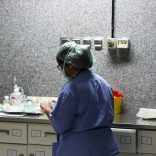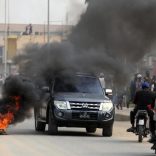Lula, Trump hold 'positive' video call, says Brazil's Finance Minister
Angola: Political activist Luaty Beirão ‘will not give up’ struggle to make country more free

File photo: António Cotrim / Lusa
Angolan political activist Luaty Beirão has pledged not to “throw in the towel” in the fight to make his country more free, even if the struggle no needs to take different forms as political circumstances change.
Beirão – whose fame as a rapper was overtaken by his status as an opponent of the decades-long regime of José Eduardo dos Santos – made the comments in an interview with Lusa and French public broadcaster RFI, in a break from a conference in Paris on the ongoing transition in Angola since João Lourenço took over as president last year. According to Beirão, there is a need to make the most of the “rhetoric of opening up” used by new head of state.
“The struggle does not need to take the same shape forever,” Beirão said. “In the time of [long-time president José] Eduardo dos Santos we did not have a space to talk, there was not the diversity, the plurality of voices, there was not the right to criticise, so it was necessary for us to be confrontational and to conquer that space.
“At this moment there is a rhetoric of opening up, so that opening has to be explored.”
According to Beirão, one of the best-known opponents of dos Santos when he was president, “people now feel that they have that space to act” and that they must “make use of these spaces of openness that exist, create bridges of dialogue and try to force the government to understand that there cannot be … development without a strong civil society.”
Civil society must find ways of showing “that we are not just about fighting”, he said. “There’s no throwing in the towel, there’s a desire to explore those new spaces that exist.”
As examples of “small things” that “within the Angolan context are enormous changes in attitude by the government vis-a-vis civil society”, Beirão cited plans for the monitoring of the electoral process carried out by the Angolan civic association Handeka, which he helped found, as well as changes to the state budget made as a result of the “influence of civil society”.
Although small, these changes “are not negligible”, he maintained. “We have to know when to applaud where it is time to applaud. But we will not give up our demands at all.”
Among these demands the activist cited the law on repatriation of capital held by Angolan citizens abroad, purportedly to boost direct investment in the country, which Beirão described as “money laundering sponsored by the state”. Thanks to the intervention of civil society, he noted, the proposals have been put on the back burner.
Speaking a day after the publication of a Reporters Without Borders report that ranked Angola 121th out of 180 countries in terms of press freedom, Beirão said that the fact that it had gone up four places “is not yet satisfactory, but there is an enormous transformation” underway in the country.
The media in Angola, he noted, has started discussing issues and cases – some involving high-level officials – in a way that “was unthinkable seven months ago” – before Lourenço took office.
The new president “has taken some attitudes that were completely unexpected” with the result that it is now possible to “start to set aside the possibility of its merely being theatre”, but it is still too early to say for sure: “there are worrying signs at the same time that there are those cheering ones”.
Among the worrying signs are continued interference by politicians in matters that pertain to the courts in the case of Angola’s former vice-president, Manuel Vicente, who is a suspect in Portugal in the Operation Fizz corruption case.
According to Beirão, everyone in Angola knows that there is now “a power struggle” between the former president, who continues to lead the governing MPLA party, and his successor as president, who is deputy leader of the party and appears to be growing in strength within it.












Leave a Reply
Be the First to Comment!
You must be logged in to post a comment.
You must be logged in to post a comment.